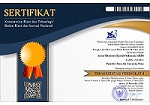Analysis of The Effect of Empowering Productive Zakat Funds on Welfare of The People
Abstract
Abstract
Zakat is one of the Islamic characteristics of the economic system, it is also one of the most effective instruments to unite humanity to help each other against the problems of poverty through respective social lives. This research was conducted to examine the effect of empowerment of Productive Zakat Funds, managed by BAZNAS, on the welfare of the people. The use of analysis technique is Simple Regression and Hypothesis Testing using T-Statistics to test the Partial Regression coefficient with a level of significance of 5%. In addition, a Classic Assumption test that includes Normality Test, Heteroscedasticity Test, and Autocorrelation Test is also carried out.
During the observation period for July 2015- December 2017, the results of the study did not find any deviation from classical assumptions, this indicates that the available data have fulfilled the requirements to use the Simple Regression Equation Model. The results of the analysis show that Productive Zakat Funds have a positive and insignificant effect on the welfare of the people as measured by the CIBEST Welfare Index, with a level of significance greater than 5%.
Keywords: Zakat, Productive, Welfare, People
Abstrak
Zakat merupakan salah satu ciri dari sistem ekonomi Islam, Zakat adalah salah satu instrumen yang paling efektif untuk menyatukan umat manusia untuk saling membantu permasalahan kemiskinanan dalam kehidupan sosial masing-masing. Penelitian ini dilakukan untuk menguji pengaruh pemberdayaan dana zakat produktif yang dikelola oleh BAZNAS terhadap kesejahteraan umat.
Teknik analisis yang digunakan adalah regresi sederhana dan uji hipotesis menggunakan t-statistik untuk menguji koefisien regresi parsial dengan level of significance 5%. Selain itu juga dilakukan uji asumsi klasik yang meliputi uji normalitas, uji heteroskedastisitas dan uji autokorelasi.
Selama periode pengamatan periode Juli 2015- Desember 2017 hasil penelitian tidak ditemukan adanya penyimpangan asumsi klasik, hal ini menunjukkan bahwa data yang tersedia telah memenuhi syarat untuk menggunakan model persamaan regresi sederhana. Dari hasil analisis menunjukkan bahwa dana zakat produktif berpengaruh positif tidak signifikan terhadap kesejahteraan umat yang diukur dengan Indeks Kesejahteraan CIBEST dengan level of significance lebih besar dari 5%.
Kata Kunci: zakat, produktif, kesejahteraan, umat
Full Text:
PDFReferences
Abidin, Hamid. (2004). Reinterpretasi Pendayagunaan Zakat. Piramedia, Jakarta.
Beik, I., S. (2009). Analisis Peran Zakat dalam Mengurangi kemiskinan: Studi Kasus Dompet Dhuafa Republika, Jurnal Pemikiran dan Gagasan, Vol. II.
El Ayyubi, Salahuddin & Saputri, Henni Eka. (2018). Analysis Of The Impact Of Zakat, Infak, And Sadaqah Distribution On Poverty Alleviation Based On The Cibest Model (Case Study: Jogokariyan Baitul Maal Mosque, Yogyakarta), International Journal of Zakat Vol. 3(2) page 85-97.
Fitriani. (2018). Performance Analysis Of Zakat Practices In Pati Regency (Case Study: The National Board Of Zakat [BAZNAS] Pati Regency, Indonesia). International Journal of Zakat Vol. 3(2) page 75-84.
Ghozali, Imam. (2013). Aplikasi Analisis Multivariate dengan Program SPSS 21. Badan Penerbit Universitas Diponegoro, Semarang.
Hasan, Muhammad. (2011). Manajemen Zakat: Model Pengelolaan Yang Efektif. Idea Press, Yogyakarta.
Hafidhuddin, Didin. (2002). Zakat Dalam Perekonomian Modern. Gema Insani, Jakarta.
Muhammad dan Ridwan Mas’ud. (2005). Zakat dan Kemiskinan Instrumen Pemberdayaan Ekonomi Umat. UII Press, Yogyakarta.
Qardawi, Yusuf. (1993). Fiqhuz Zakat. Litera AntarNusa, Jakarta.
Saefuddin, Ahmad Muflih. (1986). Pengelolaan Zakat Ditinjau Dari Aspek Ekonomi. Badan Dakwah Islamiyah, Bontang.
Saini, Mukhamat. (2016). Pemberdayaan Ekonomi Umat Melalui Zakat Produktif, Jurnal LENTERA, Vol. 14, No. 2.
Sobaya, Soya. (2010). Pengaruh Jaringan Kerja BNI Terhadap Efektifitas Zakat Produktif, Jurnal Ekonomi Islam La_Riba, Vol. IV, No. 2.
Suprayitno, E., Aslam M., and Harun, A. (2017). Zakat and SDGs: Impact Zakat on Human Development in the Five States of Malaysia. International Journal of Zakat Vol. 2(1) page 61-68.
DOI: http://dx.doi.org/10.21927/jesi.2018.8(2).81-88

This work is licensed under a Creative Commons Attribution-ShareAlike 4.0 International License.
Editorial Office:
Faculty of Islamic Economics and Business, Universitas Alma Ata
Jl. Brawijaya No.99, Jadan, Tamantirto, Kec. Kasihan, Kabupaten Bantul, Daerah Istimewa Yogyakarta 55184

JESI by http://ejournal.almaata.ac.id/index.php/JESI is licensed under a Creative Commons Attribution-ShareAlike 4.0 International License.





